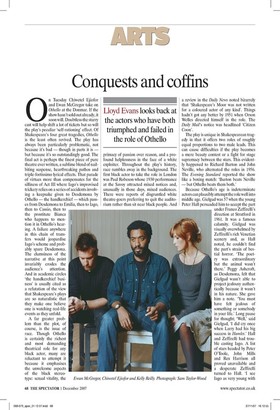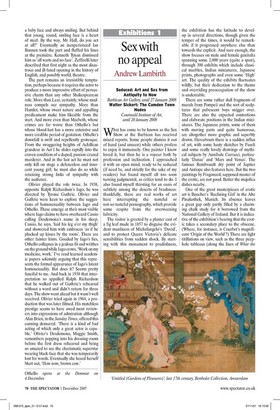Conquests and coffins
Lloyd Evans looks back at the actors who have both triumphed and failed in the role of Othello n Tuesday Chiwetel Ejiofor and Ewan McGregor take on Othello at the Donmar. If the show hasn't sold out already, it soon will. Doubtless the starry cast will help shift a lot of tickets but so will the play's peculiar 'self-rationing' effect. Of Shakespeare's four great tragedies, Othello is the least often revived. The play has always been particularly problematic, not because it's bad — though in parts it is — but because it's so outstandingly good. The final act is perhaps the finest piece of pure theatre ever written, a sublime blend of nailbiting suspense, heartbreaking pathos and triple-fortissimo lyrical effects. That parade of virtues more than compensates for the silliness of Act III where Iago's improvised trickery relies on a series of accidents involving a keepsake given to Desdemona by Othello — the handkerchief — which passes from Desdemona to Emilia, then to Iago, then to Cassio, then to the prostitute Bianca who happens to mention it in Othello's hearing. A failure anywhere in this chain of transfers would jeopardise Iago's scheme and probably spare Desdemona. The clumsiness of the narrative at this point invariably erodes the audience's attention. And in academic circles 'the handkerchief business' is usually cited as a refutation of the view that Shakespeare's plays are so naturalistic that they make one believe one is watching real-life events as they unfold.
A far greater problem than the plot, of course, is the issue of race. Though Othello is certainly the richest and most demanding theatrical role for any black actor, many are reluctant to attempt it because it emphasises the unwelcome aspects of the black stereoprimacy of passion over reason, and a profound helplessness in the face of a white exploiter. Throughout the play's history, race rumbles away in the background. The first black actor to take the role in London was Paul Robeson whose 1930 performance at the Savoy attracted mixed notices and, unusually in those days, mixed audiences. There were reports of disgruntled white theatre-goers preferring to quit the auditorium rather than sit near black people. And a review in the Daily News noted bizarrely that 'Shakespeare's Moor was not written for a coloured actor of any kind'. Things hadn't got any better by 1951 when Orson Welles directed himself in the role. The Daily Mail's notice was headlined 'Citizen Coon'.
The play is unique in Shakespearean tragedy in that it offers two roles of roughly equal proportions to two male leads. This can cause difficulties if the play becomes a mere beauty contest or a fight for stage supremacy between the stars. This evidently happened to Richard Burton and John Neville, who alternated the roles in 1956. The Evening Standard reported the show like a boxing match: 'Burton beats Neville — but Othello beats them both.'
Because Othello's age is indeterminate actors can plausibly attempt the role well into middle age. Gielgud was 57 when the young Peter Hall persuaded him to accept the part under Franco Zeffirelli's direction at Stratford in 1961. It was a famous calamity. Gielgud was visually overwhelmed by Zeffirelli's rich Venetian scenery and, as Hall noted, he couldn't find the part's strain of bestial horror. 'The poetry was extraordinary but the animal wasn't there.' Peggy Ashcroft, as Desdemona, felt that Gielgud wasn't able to project jealousy authentically because it wasn't in his nature. She gave him a note. 'You must have felt jealous of something or somebody in your life.' Long pause for thought; 'Well,' said Gielgud, 'I did cry once when Larry had his big success in Hamlet.' Hall and Zeffirelli had trouble casting Iago. A list of stars headed by Peter O'Toole, John Mills and Rex Harrison all proved unavailable and a desperate Zeffirelli turned to Hall. 'I see a baby face and always smiling. But behind that young, round, smiling face is a heart of steel. By the way, Mr Hall, do you act at all?' Eventually an inexperienced Ian Bannen took the part and fluffed his lines at the premiere. Kenneth Tynan dismissed him as 'all warts and no face'. Zeffirelli later described that first night as the most disastrous and ill-fated opening in the history of English, and possibly world, theatre.
The part remains an irresistible tempta tion, perhaps because it requires the actor to produce a more impressive effort of persuasive charm than any other Shakespearean role. More than Lear, certainly, whose madness compels our sympathy. More than Hamlet, whose sweet nature and appalling predicament make him likeable from the start. And more even than Macbeth, whose crimes are far worse than Othello's but whose blood-lust has a more extensive and more credible period of gestation. Othello's downfall is swift and repellently grotesque. From the swaggering heights of Achillean grandeur in Act I he slides rapidly into the craven condition of a duped, passion-crazed murderer. And in the last act he must not only kill on stage a defenceless and innocent young girl; he must also do so while retaining strong links of sympathy with the audience.
Olivier played the role twice. In 1938, opposite Ralph Richardson's Iago, he was directed by Tyrone Guthrie. Olivier and Guthrie were keen to explore the suggestions of homosexuality between Iago and Othello. These emerge at their most visible where Iago claims to have overheard Cassio calling Desdemona's name in his sleep. Cassio, he says, 'laid his leg o'er my thigh' and showered him with embraces 'as if he plucked up kisses by the roots'. There are other fainter hints. Goaded by Iago's lies, Othello collapses in a jealous fit and writhes on the ground while Iago crows, 'Work on my medicine, work.' I've read learned academic papers solemnly arguing that this represents the formal appearance of Iago's latent homosexuality. But does it? Seems pretty fanciful to me. And back in 1938 that interpretation so appalled Ralph Richardson that he walked out of Guthrie's rehearsal without a word and didn't return for three days. The show went ahead but it wasn't well received. Olivier tried again in 1964, a production that was later filmed. His matchless prestige seems to have awed most reviewers into expressions of admiration although Alan Brien, in the Sunday Times, offered this cunning demurral. 'There is a kind of bad acting of which only a great actor is capable.' Olivier's Desdemona, Maggie Smith, remembers popping into his dressing-room before the first dress rehearsal and being so amazed to see the charismatic superstar wearing black-face that she was temporarily lost for words. Eventually she heard herself blurt out, 'How now, brown cow.'






































































 Previous page
Previous page